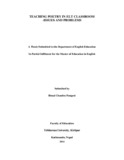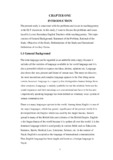Please use this identifier to cite or link to this item:
https://elibrary.tucl.edu.np/handle/123456789/1924| Title: | Teaching Poetry in Elt Classroom-Issues and Problems |
| Authors: | Pangeni, Bimal Chandra |
| Keywords: | teaching poetry;Figurative language;Humor;Imagination |
| Issue Date: | 2014 |
| Publisher: | faculty of Education |
| Abstract: | This research studyis to present a study of the situation of teaching poetry at LowerSecondary Level. The title of the thesis is“Teaching Poetry in ELT Classroom-Issuesand Problems”.The main objective of this study wasto identify the issues and theproblems faced by lower secondary English teachers in teaching poetry.The populationof the study werethe forty lower secondary English language teachers of twenty Schools(two English teachers from each school)of Nawalparasidistrict. To fulfilthe objectivesof this study, an effective tool of survey research,questionnaire hadbeen used and thequestionnaires hadbeen administered to the teachers. The obtained data hadbeentabulated and analyzed using explanation method and the simple statistical tools ofpercentage.It was foundthatabig size of the teachers use the activities in teachingpoetry like games on vocabulary, recitingpoem with rhyme, matching poems line withits paraphrase, picturizationmethod, dramatization and so on as effective ways.And alltheteachersfelt difficulties if there werenot given rhyming wordsin the poem.It contains five chapters. The firstchapter leads to a short introduction about the generalbackground, statement of the problem, rationale of the study, objectives of the study,research question, significance of the study, delimitations of the study, and operationaldefinition of the key terms. The second chapter summarizes the review of relatedtheoretical literature, review of related empirical literature, implication of the review forthe study and conceptual framework. The third chapter contains the methods andprocedures of the study which deals with design of the study, population and sample ofthe study, sampling procedure, data collection tools, and data collection procedure. Thefourth chapter consists of the result and discussion of the collected data. The last chapterdeals with the summary, findings, and some pedagogical implications based on theanalysis and interpretation of the data. References and appendices are attached at the end. |
| URI: | http://elibrary.tucl.edu.np/handle/123456789/1924 |
| Appears in Collections: | English Language Education |
Files in This Item:
| File | Description | Size | Format | |
|---|---|---|---|---|
| cover.pdf | 33.09 kB | Adobe PDF |  View/Open | |
| chapter.pdf | 189.66 kB | Adobe PDF |  View/Open |
Items in DSpace are protected by copyright, with all rights reserved, unless otherwise indicated.
